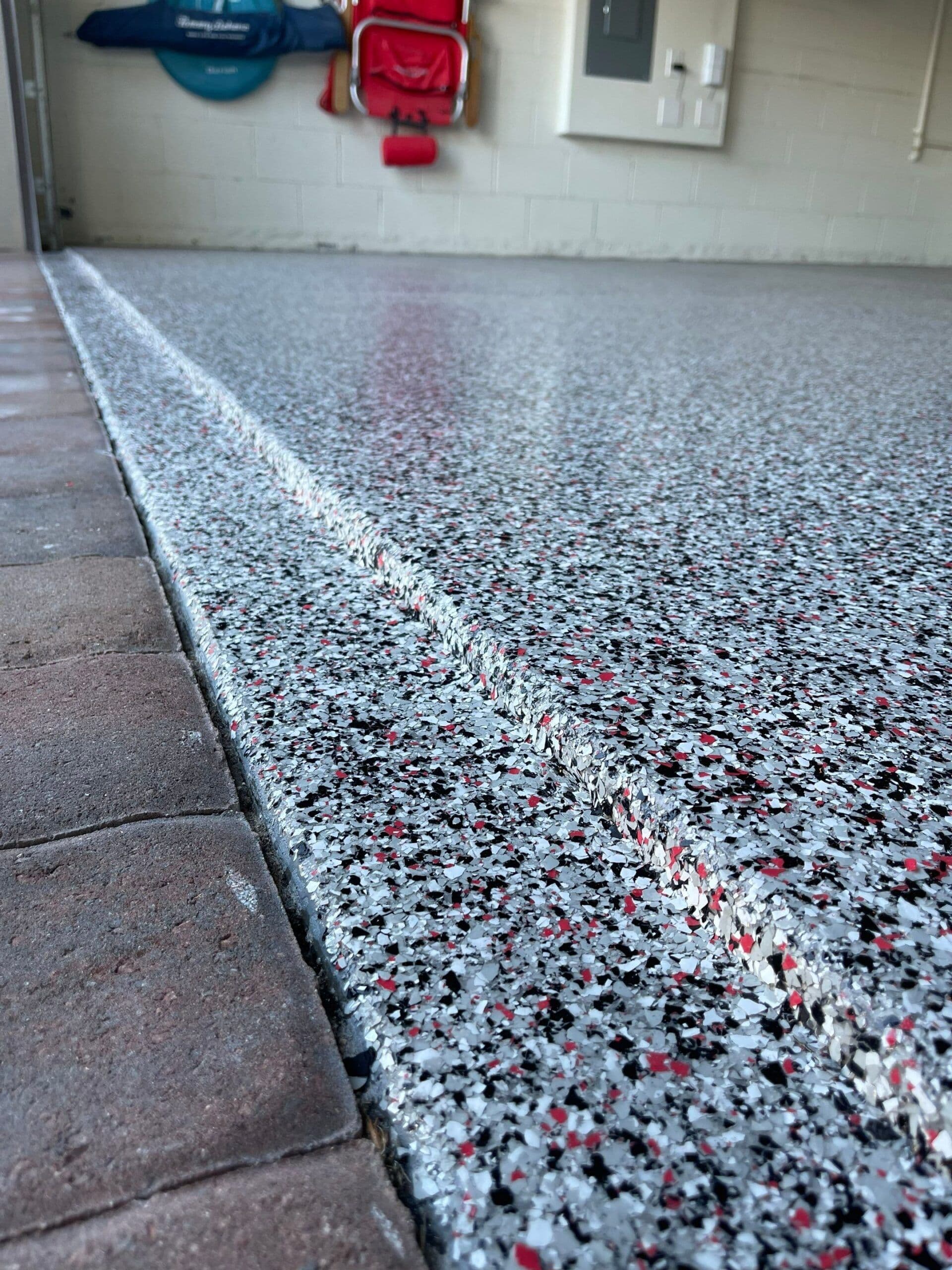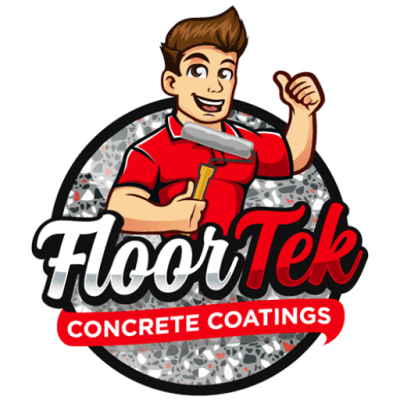How Long Does Epoxy Last? The Honest Truth from Installers
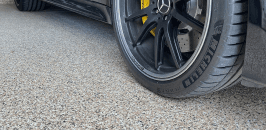
When homeowners start researching a new floor coating, one of the first questions they ask is, "How long does epoxy last?" It’s the critical question, and you deserve a straight answer. As professional installers at Floortek Coatings, we’ve replaced hundreds of failed floors, and the most common failure we see is epoxy.
The short, honest answer is that a professionally installed epoxy floor might last 3 to 5 years before it starts to show significant problems, such as peeling, fading, or staining. If you’re looking at a DIY kit from a big-box store, you could be facing a lifespan of just 1 to 2 years before problems begin.
We know that’s not what the labels promise. You’re looking for a one-and-done solution for your garage, basement, or patio, not a temporary fix that creates a bigger mess down the road. The problem isn't just about the product; it's about the technology. Epoxy is an older technology, and frankly, it has limitations that manufacturers don't like to talk about.
That's why we're open about it. We don't sell epoxy. Why? Because we can't stand behind it. We believe in providing a solution that actually lasts. We've built our business on a coating system that is 10X better than epoxy and can be installed in just one day.
If you’re wondering how long epoxy lasts, you’re already asking the right questions. Now, let us walk you through the why behind those short lifespans and show you what a permanent solution looks like.
The Real Breakdown: How Long Does Epoxy Last in the Real World?
You’ll see a wide range of answers online about epoxy's lifespan, from 2 years to 20 years. This variation exists because "epoxy" isn't one single product. The answer to "how long does epoxy last" depends entirely on the quality of the materials and, most importantly, the installation process.
The DIY Epoxy Kit (1-2 Years)
This is the most common type of epoxy homeowners encounter. These kits are appealing because they seem inexpensive and straightforward. However, they are the most frequent source of flooring failures we are called to fix.
Thin Material: These kits are often "water-based" or "low-solids" epoxy, meaning the coating is thin once it cures. It simply doesn't have the thickness to handle vehicle traffic or dropped tools.
Poor Preparation: The instructions often suggest a simple acid etch or a power wash. This is not enough. Concrete is a porous material that can hold moisture and contaminants. Without professional diamond grinding, the epoxy never achieves a deep, mechanical bond. It just sits on top, waiting to peel off.
Fast Failure: You will often see peeling and "hot tire pickup" within the first one or two seasons. When you pull your car in from a hot US highway, the hot, soft rubber of your tires can re-bond with the epoxy, pulling it right off the floor when you back out.
The "Professional" Epoxy Install (3-5 Years)
A professional installer will use a 100% solids epoxy, which is a much thicker and more durable product than a DIY kit. They will also use a diamond grinder to properly prepare the concrete, which is the correct first step.
This is a much better option, but it still has fundamental flaws. Even with perfect installation, the limitations of the epoxy chemistry itself will cause it to fail. We see these floors start to degrade around year 4 or 5. They may not peel as quickly as a DIY job, but they will chip, stain, and—most noticeably—turn yellow. This leads many homeowners to search for garage resurfacing epoxy options all over again.
Why Does Epoxy Fail? The Factors That Shorten Its Lifespan
We've already touched on a few issues, but let's dive deeper. When you ask, "How long does epoxy last?" you're really asking, "What will make my new floor fail?" Here are the primary culprits.
1. Hot Tire Pickup
This is the number one killer of epoxy garage floors. It’s a simple chemical reaction. Your car tires get extremely hot from friction with the road. When you park on an epoxy floor, that heat softens the epoxy's rigid chemical structure. As the tires cool, they contract and bond slightly to the coating. The next time you pull your car out, the bond is strong enough to rip the coating right off the concrete. This is a tell-tale sign of an epoxy failure.
2. UV Instability (Yellowing)
Epoxy is not UV-stable. It contains a chemical component (an aromatic bisphenol-A), as noted in technical manuals from the US Occupational Safety and Health Administration (OSHA), that is reactive to ultraviolet light. If your garage has windows, or if you're even considering using it for a patio or driveway coating service, the floor will turn yellow.
We call this "ambering." A beautiful light gray or blue flake floor will look dingy, yellow, and old within a couple of years. This is especially true in sunny parts of the United States, where the constant UV exposure accelerates the breakdown. Research from the National Institute of Standards and Technology (NIST) confirms that amine-cured epoxy (the most common type) undergoes "rapid photodegradation" when exposed to UV light. It's not a matter of if it will turn yellow, but when.
3. Moisture and Vapor Transmission
Concrete is like a hard sponge. It constantly pulls moisture from the ground beneath it, a process called moisture vapor transmission. Epoxy is a non-breathable, topical sealer. It creates a plastic-like sheet over the concrete. When that moisture vapor rises, it gets trapped under the epoxy.
This trapped moisture builds hydrostatic pressure, creating blisters and bubbles, and eventually causing the coating to peel off in large sheets. Technical research from institutions such as Purdue University indicates that this "moisture transport" is a complex and ongoing force in concrete slabs, making them a difficult substrate for non-breathable coatings. A professional installer should test for moisture, but even then, epoxy is just not the right technology to handle it.
4. Lack of Flexibility (Chipping and Cracking)
Epoxy cures into a tough, rigid surface. This sounds like a good thing, but it’s actually a significant weakness. Your concrete slab naturally expands and contracts with temperature changes. In the cold winters, it shrinks. In the summer heat, it expands.
Because epoxy is so rigid, it can't flex with the concrete. This creates stress, and the coating will eventually crack or chip. If you drop a heavy wrench or a hammer, the rigid epoxy is more likely to shatter or chip at the impact point, leaving an ugly divot that breaks the seal and allows moisture to get underneath.
When you weigh all these factors, the initial question of "how long does epoxy last" gets a much more complicated answer. It lasts until your tires get too hot, until the sun hits it, or until the natural moisture in your concrete pushes it off.
The Signs of a Failing Epoxy Floor
You can see these failures in your own neighborhood. Go to our Gallery to see some of the failed epoxy floors we've been called in to replace.
The common signs include:
Peeling: Especially where car tires sit, but it can also start from the control joints in the concrete.
Yellowing/Ambering: The most obvious sign. The color you picked is no longer the color you have.
Stains: Epoxy is porous and can be stained by car oils, chemicals, and even road salt.
Blistering: Small or large bubbles in the finish, indicating a moisture problem.
Cracking: Hairline or larger cracks that mirror the cracks in the concrete underneath.
When you see these issues, you realize the actual lifespan of an epoxy floor is much shorter than you were led to believe. This is why our team at Floortek Coatings had to find a better way.
How Long Does Epoxy Last vs. a Modern Polyaspartic Coating?
After seeing epoxy fail time and time again, we switched to a modern, advanced polymer technology: polyaspartic coatings. The difference is night and day. So, is polyaspartic better than epoxy? Yes, without question.
A polyaspartic floor coating is a type of polyurea, a material known for its extreme durability (you'll find it used as truck bed liners and on bridge decks). Our polyaspartic system is chemically engineered to solve every single problem that epoxy creates.
This isn't just a slightly better product; it's an entirely different class of material. It is 10X better than epoxy in every measurable way.
How long does epoxy last with hot tires? It doesn't. It peels.
How long does a polyaspartic floor last with hot tires? Indefinitely. It has a much higher heat tolerance and chemical resistance. It will not stick to your hot tires.
How long does epoxy last in the sun? It yellows almost immediately.
How long does a polyaspartic floor last in the sun? Indefinitely. Our polyaspartic garage floor coatings are 100% UV-stable. They will never yellow or fade, which is why we can confidently install them on a pool deck coating service or a sidewalk coating service in direct, all-day sun.
How long does epoxy last with impacts? It chips and cracks.
How long does a polyaspartic floor last with impacts? It is built to be flexible. When you drop a tool, our coating absorbs the effect and flexes to prevent chipping or cracking. It moves with your concrete's seasonal shifts, not against it.
How long does epoxy last with moisture? It blisters and peels.
How long does a polyaspartic floor last with moisture? Our system is deep-penetrating. It doesn't just sit on top; it chemically bonds inside the concrete's pores, creating a bond that is three times stronger than epoxy's. This bond is so strong that it can withstand high levels of moisture vapor transmission.
This technology is the answer to the question, "What is the best garage floor coating?" It's not just a coating; it's a permanent fusion with your concrete.
Why We Stand Behind Our 1-Day Polyaspartic Coatings
The About us page on our site tells our whole story, but the short version is this: we got tired of explaining to homeowners why their expensive "professional" epoxy floor was failing after just a few years. We wanted to offer a real solution.
Our Coating Products are based on this superior polyaspartic technology. Here’s why we believe in it so strongly.
1. It’s a 1-Day Installation
Epoxy installations are a 3-to-5-day process. You have to wait for each coat (primer, color, clear coat) to cure, sometimes for 24 hours. Then, you have to wait another 3-7 days before you can walk on it or park your car.
Our 1-day garage floor coating system is revolutionary. We arrive in the morning, diamond-grind the floor, repair any cracks, and apply our deep-penetrating polyaspartic base coat. We broadcast your choice of Colors and Flake Options, then, after a short cure time, apply our UV-stable polyaspartic clear coat.
The floor is ready for foot traffic in just a few hours, and you can park your car on it the very next day. You get your garage back immediately.
2. It Lasts for the Life of Your Home
Because our system is flexible, UV-stable, and bonds deep into the concrete, it doesn't have the "expiration date" that epoxy does. We are so confident in our polyaspartic garage floor coating that we back it with our Life-of-Home warranty.
This isn't a prorated, 5-year warranty like you get with epoxy. This warranty protects your floor from peeling, chipping, or yellowing for as long as you live in your home. That’s the difference between a temporary fix and a permanent solution. The debate over the life expectancy of polyurea vs. epoxy coatings is settled.
3. It’s Versatile for Your Entire Property
The stability and durability of our coatings mean they aren't just for the garage. We can bring this same level of protection and beauty to all of your concrete surfaces. This includes:
Garages: The perfect polyaspartic garage floor solution that stands up to cars, tools, and chemicals.
Patios: Our patio coating service will never fade or yellow in the sun.
Pool Decks: A beautiful, textured, and durable surface for your pool deck coating service.
Driveways: Create stunning curb appeal with our driveway coating service.
Basements: A clean, bright solution for your Basement coating service.
Sidewalks: Enhance your home's walkways with our sidewalk coating service.
No matter the application, the technology is superior to any epoxy product on the market.
How Long Does Epoxy Last? Don't Settle for the Answer.
So, let's return to the original question. How long does epoxy last? Not long enough.
It doesn’t last long enough to justify the cost. It doesn’t last long enough to withstand a hot US summer. It doesn't last long enough to give you peace of mind. And when it fails, it’s a nightmare to remove, often requiring expensive grinding to get the peeling mess off the floor before you can even think about installing a new one.
You are asking this question because you are a homeowner who does their research. You want to make a wise, long-term investment in your home. The polyaspartic garage floor coating vs epoxy comparison makes the choice clear. Don't invest in a temporary, 1980s-era technology that will only lead to frustration.
At Floortek, we believe in doing it right the first time. That's why we use our advanced polyurea coating for the garage floor system. It's the only one we trust, and it's the only one you should, too.
Let us show you the difference. You can explore our Colors and Flake Options or learn more about polyurea concrete coating. When you're ready, the next step is simple.
Frequently Asked Questions (FAQs)
1. How long does epoxy really last in a garage?
In a typical garage, a professionally installed epoxy floor may last 3 to 5 years before it starts to peel from hot tires or yellow from sunlight. A DIY kit floor often fails in just 1 to 2 years.
2. Why does my neighbor's epoxy floor look yellow?
Your neighbor's floor looks yellow because epoxy is not UV-stable. The resins inside it react to ultraviolet light from windows or an open garage door, causing them to "amber" (turn yellow) over time.
3. Will epoxy peel up from hot tires?
Yes, this is one of the most common epoxy failures. It's called hot tire pickup. The heat from your car tires softens the rigid epoxy, and as the tires cool, they bond to the floor and pull the coating up when you back out.
4. How long does epoxy last in a hot climate?
Epoxy's lifespan is much shorter in hot climates. The combination of intense UV light and hotter roads accelerates yellowing, and hotter roads mean your tires get hotter, leading to faster hot-tire pickup and peeling.
5. How long does epoxy last in a cold climate?
In cold climates, epoxy becomes even more brittle and rigid. When the concrete slab expands and contracts with the freeze-thaw cycles, the epoxy can't flex with it, leading to cracking and chipping. Road salt brought in on your car can also stain and degrade the surface.
6. What lasts longer than an epoxy floor?
A polyaspartic coating system lasts significantly longer than an epoxy coating system. It is 10X better, 100% UV stable (so it won't yellow), more flexible (so it won't chip), and has a much stronger chemical bond to the concrete, which is why a Life-of-home warranty backs it.
7. Is it worth it to put epoxy on my garage floor?
Given that the answer to "how long does epoxy last" is only a few years, we don't believe it's a good long-term investment. You will likely face a costly repair or replacement in 3-5 years. A polyaspartic coating is a permanent, one-time investment.
8. Can you put polyaspartic coating over epoxy?
No, you should never coat over a failing epoxy floor. The new coating will only be as strong as the underlying epoxy. A professional company like Floortek will always diamond-grind the old, failing epoxy off the floor to get to the bare concrete for a new, permanent bond.
9. How long does epoxy last if I install it myself?
A DIY epoxy kit typically lasts 1-2 years. These kits have weaker materials and rely on acid etching, which doesn't adequately prepare the concrete for a strong bond, leading to fast peeling and failure.
10. What is the difference between polyaspartic and epoxy garage floor lifespan?
An epoxy floor has a limited lifespan of 3-5 years before it fails from peeling, chipping, or yellowing. A polyaspartic vs epoxy garage floor is designed to be permanent, lasting for the life of your home without failing.
Stop Worrying About Peeling Floors
You started by asking, "How long does epoxy last?" Now you know the honest answer—and you also know there's a permanent solution.
Don't settle for a floor that will fail. Let our team at Floortek give you a beautiful, durable floor that lasts. Our 1-day floor coatings are 10X better than epoxy and backed by our Life-of-home warranty.
For a limited time, we are offering 30% off on the first installation for new customers.
Get your Free Quote today. Call us at 844-844-4164 or contact us through our website to schedule your no-obligation consultation.
FREE In-Home Estimate
Plus 30% Off
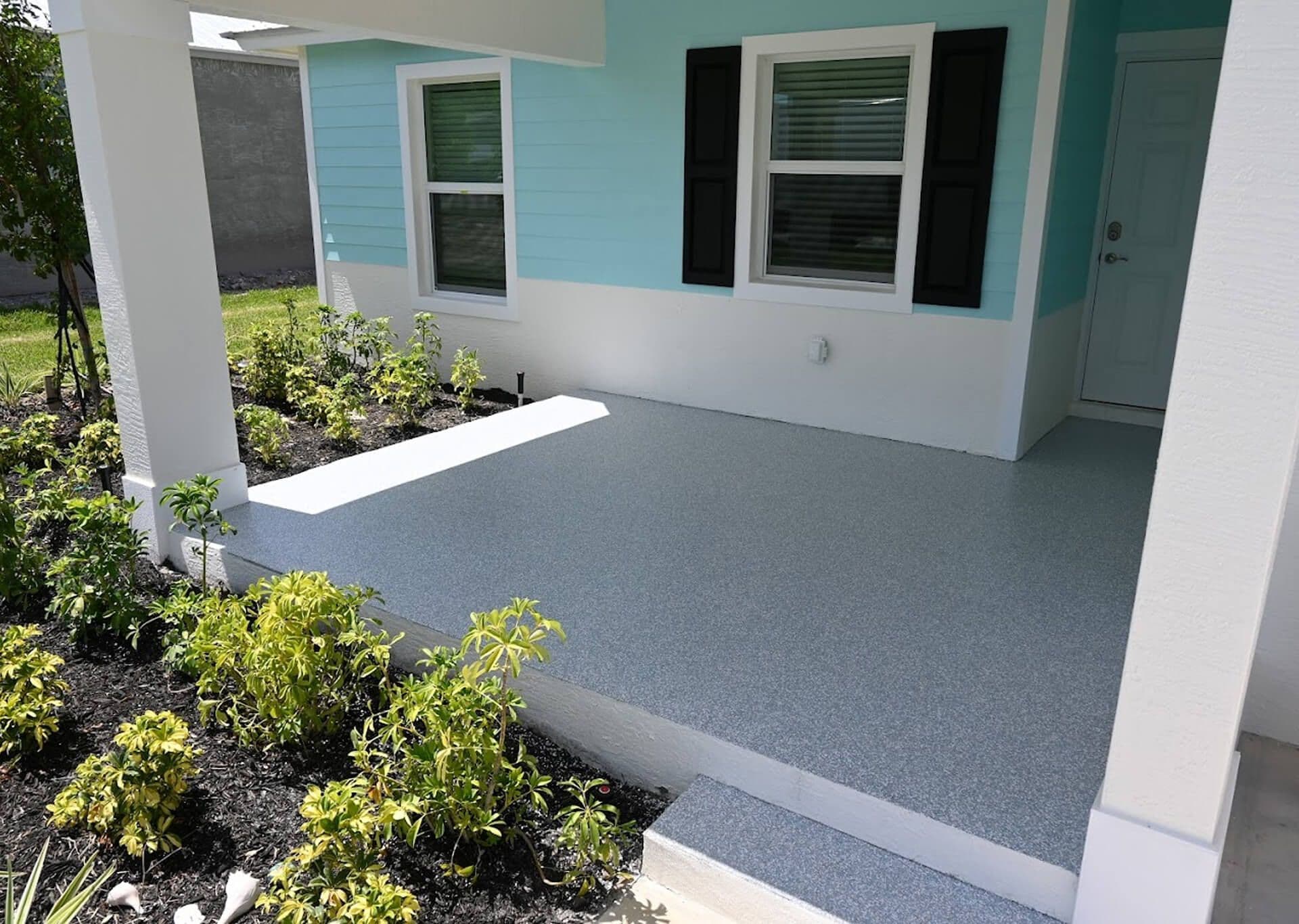
Testimonials
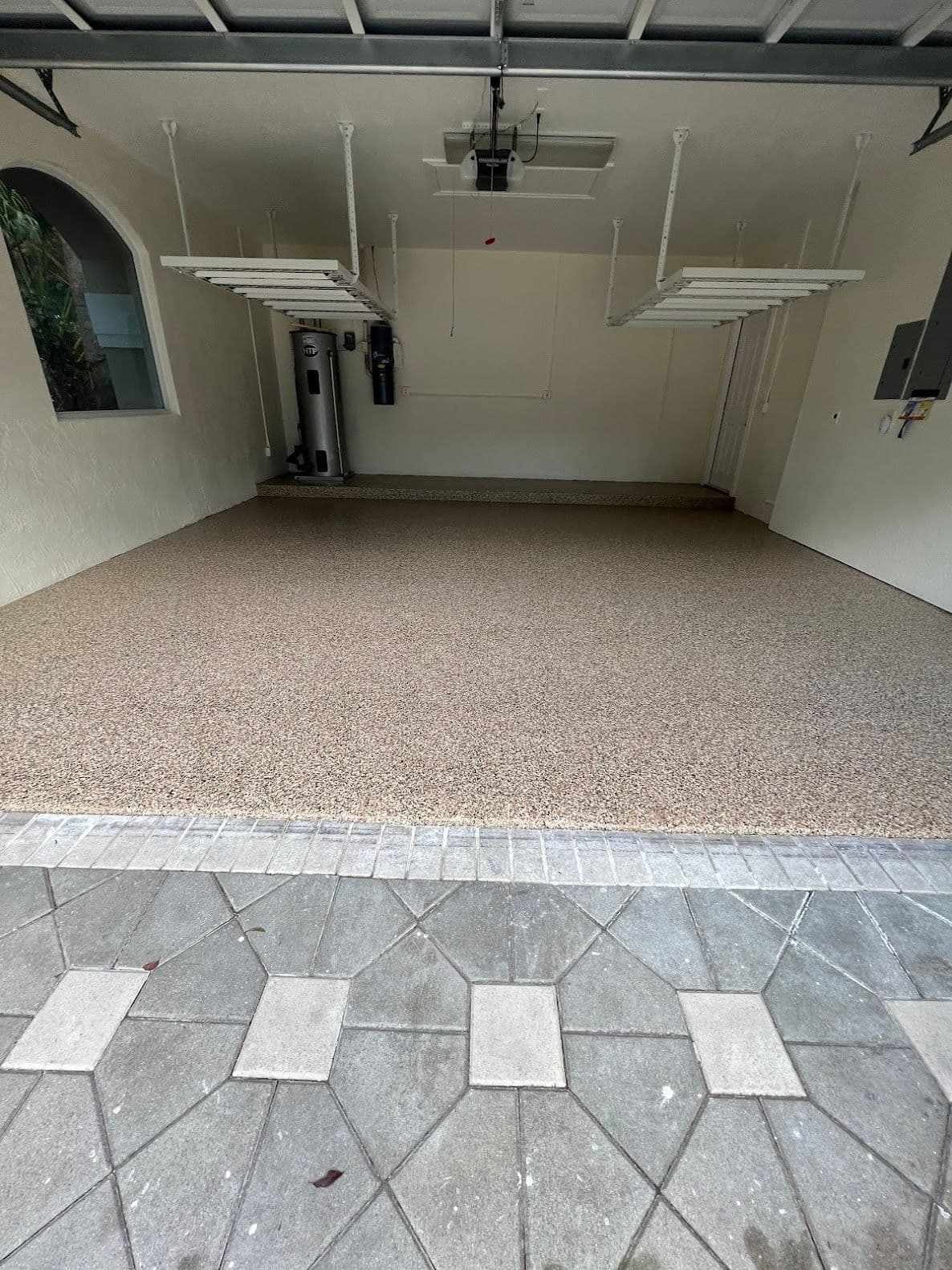
We had both of our garages done and an outdoor concrete platform. The crew was courteous and professional. Everyone from Nancy our salesperson to Patrick, the manager, Logan and his crew were outstanding. Our floors look fantastic and we were very happy we chose this company.
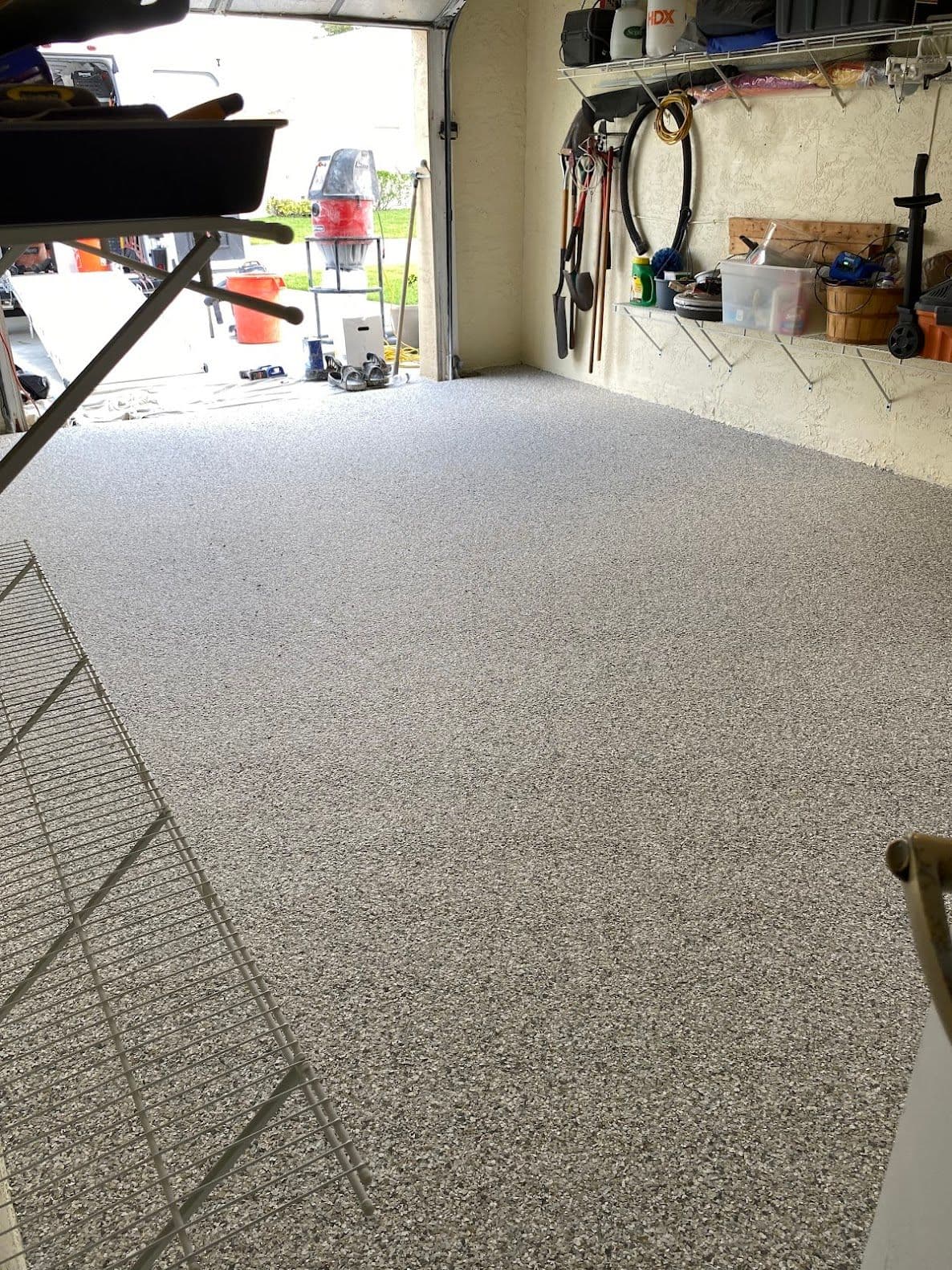
I am very pleased with the quality of work FloorTek has done for me. The two employees that did the actual work were very courteous, worked hard, and explained everything they were doing. Thank you for a great job.
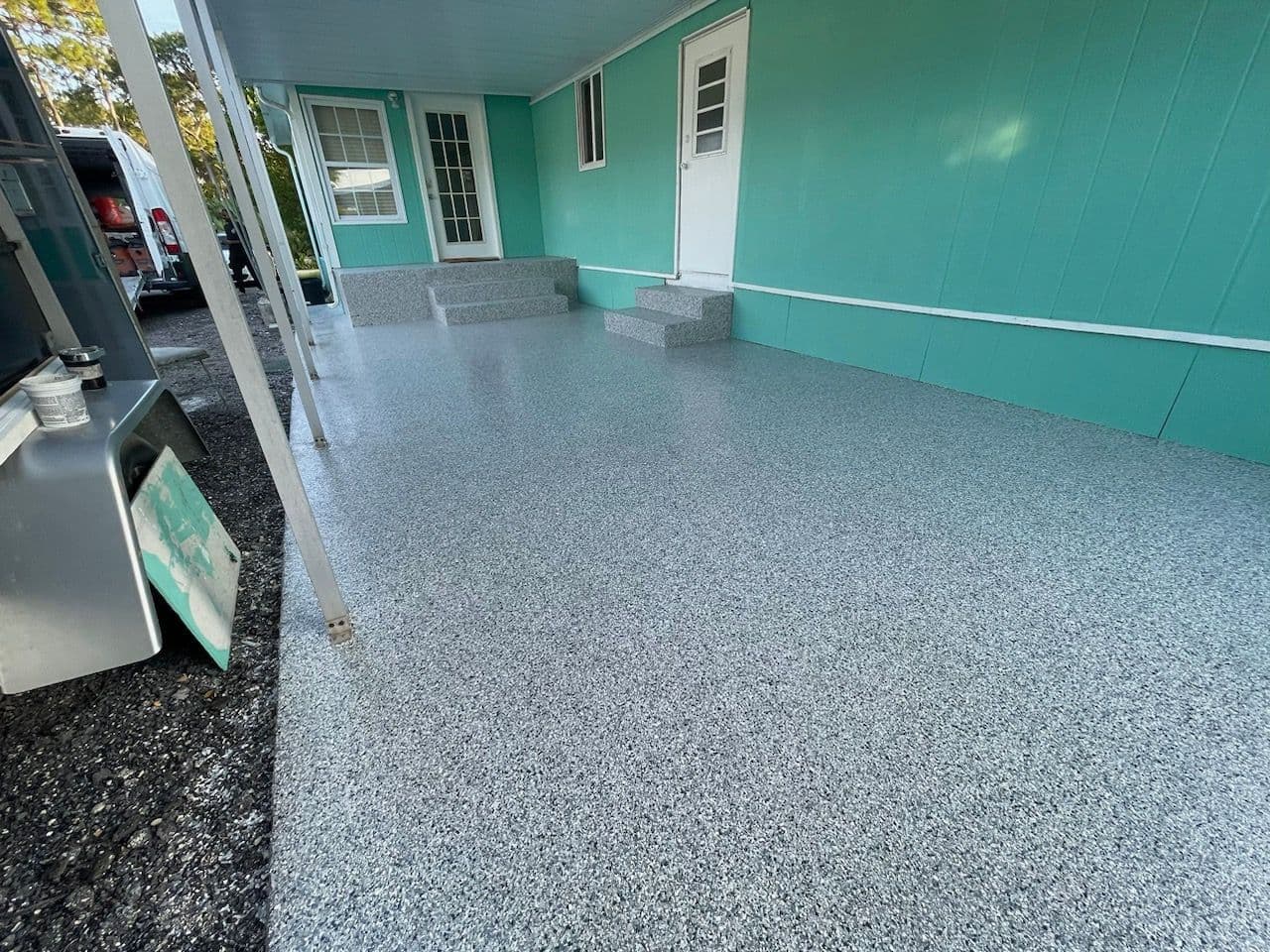
I was happy with the job Floortek did. Good customer communication and customer relationship. My old ugly porch was transformed and I love it. Nancy was very helpful throughout the process. Just know that rain may impact your schedule to make sure the products at highest quality during application.



Contact FloorTek Today
